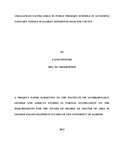| dc.description.abstract | This was a cross-sectional study on challenges facing girls in public primary schools in accessing
sanitary towels in Kasikeu division in Makueni County. Specifically, the study sought to identify
the challenges faced by girls in public primary schools in accessing sanitary towels and identify
strategies put in place to address challenges faced by girls in public primary schools in accessing
sanitary towels.
The study was guided by the Social Exclusion Theory advanced by Starrin et al., (1999). Social
exclusion attempts to make sense out of multiple deprivations and inequities experienced by
people and areas, and the reinforcing effects of reduced participation, consumption, mobility and
access among others. Sampling was purposively done to reach girls who are menstruating and
within classes five and eight of upper primary in Kasikeu division and to identify key informants
to the study. Data were collected through in-depth interviews, key informant interviews, and
focus group discussions and analyzed thematically guided by the study objectives.
The findings indicate that the average cost of commercial sanitary pads were way above the
affordability of the primary school girls compounded by high poverty level in Kasikeu division,
poor families lack adequate clothing that could be converted into home-made sanitary rugs, lack
of sanitary towels has a direct bearing on absenteeism. Similarly, the study established
inadequate knowledge amongst girls and parents around menstruation hygiene management and
lack of open discussion around the subject so mystified in secrecy amongst the people of
Kasikeu.
The study concludes that the high prevalence of poverty in Kasikeu division has constrained
most girls and their parents from accessing the sanitary towels. Socially, lack of privacy for
changing menstrual materials, leakage from poor quality materials, lack of resources for washing
such as soaps, limited education for girls on menstruation and the taboo nature of menstruation
are found to be constraint factors in the study | en |

